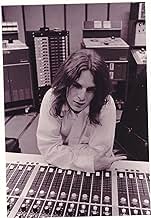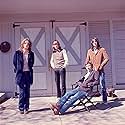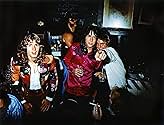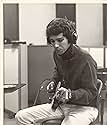AVALIAÇÃO DA IMDb
7,1/10
1,5 mil
SUA AVALIAÇÃO
Adicionar um enredo no seu idiomaBig Star: Nothing Can Hurt Me is a feature-length documentary film about the dismal commercial failure, subsequent massive critical acclaim, and enduring legacy of pop music's greatest cult ... Ler tudoBig Star: Nothing Can Hurt Me is a feature-length documentary film about the dismal commercial failure, subsequent massive critical acclaim, and enduring legacy of pop music's greatest cult phenomenon, Big Star.Big Star: Nothing Can Hurt Me is a feature-length documentary film about the dismal commercial failure, subsequent massive critical acclaim, and enduring legacy of pop music's greatest cult phenomenon, Big Star.
Lester Bangs
- Self
- (cenas de arquivo)
Chris Bell
- Self
- (cenas de arquivo)
The Box Tops
- Themselves
- (cenas de arquivo)
Panther Burns
- Themselves
- (cenas de arquivo)
Alex Chilton
- Self
- (cenas de arquivo)
Steve Cohen
- Self - U.S. Congressman
- (cenas de arquivo)
The Cramps
- Themselves
- (cenas de arquivo)
Avaliações em destaque
As a voracious consumer of "Rock Docs," this one left me flat. The story is told in such a way that it is nearly impossible to follow (unless you are a Memphis super fan, I guess). It ambled along following every little thread until I just didn't care anymore.
As with "Mr. Blue Sky" (the Geoff Lynne doc), the superlatives flow like water. After a while, they just become meaningless.
And most important of all, I didn't leave this film and rush straight to ITUNES to download their work. If the music is as good as the interviewees bleated on about; they were not able to convey it within the film itself.
As with "Mr. Blue Sky" (the Geoff Lynne doc), the superlatives flow like water. After a while, they just become meaningless.
And most important of all, I didn't leave this film and rush straight to ITUNES to download their work. If the music is as good as the interviewees bleated on about; they were not able to convey it within the film itself.
This is a documentary about a 70's Memphis band. They have good critical support but never gains popular support. They struggle with the business and Big Star eventually fades into oblivion only to become a cult band which nobody has ever heard of and only the coolest music geeks can lay claim to. I myself don't know the band. I have never heard of their music. The only familiar song is 'In the Street' which was remade into the theme of 'That 70's Show'. I see some of their interesting famous fans. It would nice to showcase them earlier in the doc giving them needed praises. That's the normal practice to hype up the band. By putting it in the back, the intensity isn't there. If these famous artists love them, then I'm more motivated to know them. About their music, they sound good but none of it is that catchy. They sound professional. They sound sincere. They sound artful. There is an indie sensibility that would become more popular today. My biggest issue with the documentary format is that I couldn't tell who was from the band. None of them have great charisma in the present day. The two important voices in the band are no longer with us. It's tough to get a hold of their personalities when most of it is told in second-hand. It's the difference between a faded photograph and being in the same room. It has some fascinating behind-the-scene aspects. It would probably make for a great biopic movie where actors can give these people great personalities. The old footage can only give glimpses of the old days. It's told in a manner of faded memories. It's artistic but it's never visceral. It's sad but it's not enthralling. This is a good band who never reached the mountain top. There's a good story somewhere here.
BIG STAR: Nothing Can Hurt Me is a 2012 documentary about the eponymous 1970s pop-rock band from Memphis that saw few sales in spite of enormous critical acclaim, but went on to become a cult phenomenon and inspire some great bands in the decades that followed. The documentary was made without the participation of Big Star's surly frontman Alex Chilton (and it was completed following Chilton's untimely death), but it does feature interviews with bassist Andy Hummel, drummer Jody Stephens, and the musicians brought on when Chilton announced a new Big Star in the 1990s. Furthermore, producer John Fry appears throughout the documentary and appears to have had a bigger role in the Big Star story than many listeners might have imagined.
The film begins with the Memphis context of the late 1960s/early 1970s. Chilton, who had already had a chart hit with the band The Box Top and toured the country, comes home and starts a new band with Chris Bell. The process of recording Big Star's first album "#1 Record" is explained in some depth, from how the band used the available studio resources to where the iconic cover art came from.
We learn how Bell splits after the first album, has a nervous breakdown and flirts with evangelical Christianity, tries to make it as a musician in England and cuts the legendary single "You and Your Sister/I am the Cosmos", and finally dies in 1978 of a car crash at only 27 years old. There are poignant interviews with Bell's older brother and sister-in-law, but part of Bell's angst was his homosexuality, and everyone is uncomfortable even approaching this subject.
The documentary continues through the recording of Big Star's second ("Radio City") and third ("Third/Sister Lovers") records, followed by the ultimate breakdown of relations between Jody Stephens and Alex Chilton and the end of Big Star. There's some brief coverage of Chilton's solo career through the 1980s and the reformed Big Star in the 1990s and early millennium. There are some brief comments from later, perhaps more famous musicians that express an eternal debt to Big Star, like Teenage Fanclub and Mike Mills of R.E.M.
This is one of those documentaries that, to a degree, expects viewers to already know quite a bit about the band in question, making it somewhat frustrating for those who know Big Star's name and legacy but not so much the band's career and arc. It is mentioned that #1 Record sold poorly through label problems, but it's as if the viewer is already supposed to know that it was poorly distributed. It is mentioned briefly that Chris Bell died in a car crash, but with little detail. And there are some aspects of the production that seem mystery. For example, why does Jody Stephens have such a bad attitude throughout his interviews? Still, I enjoyed BIG STAR: Nothing Can Hurt Me overall. So many rock documentaries interview people who exploded into stardom, moved to la-la-land like California and seem to live on another planet compared to non-celebrities. Here, on the other hand, it's amazing just what ordinary southern Americans these people are, who clearly have some good memories of their youth but never really went for celebrity culture. They could be one's neighbours or the people you pass in the supermarket. That's not to say that they aren't interesting, as they include some quirky characters like the affably campy John King and producer Jim Dickinson's elderly but eternally young widow.
The film begins with the Memphis context of the late 1960s/early 1970s. Chilton, who had already had a chart hit with the band The Box Top and toured the country, comes home and starts a new band with Chris Bell. The process of recording Big Star's first album "#1 Record" is explained in some depth, from how the band used the available studio resources to where the iconic cover art came from.
We learn how Bell splits after the first album, has a nervous breakdown and flirts with evangelical Christianity, tries to make it as a musician in England and cuts the legendary single "You and Your Sister/I am the Cosmos", and finally dies in 1978 of a car crash at only 27 years old. There are poignant interviews with Bell's older brother and sister-in-law, but part of Bell's angst was his homosexuality, and everyone is uncomfortable even approaching this subject.
The documentary continues through the recording of Big Star's second ("Radio City") and third ("Third/Sister Lovers") records, followed by the ultimate breakdown of relations between Jody Stephens and Alex Chilton and the end of Big Star. There's some brief coverage of Chilton's solo career through the 1980s and the reformed Big Star in the 1990s and early millennium. There are some brief comments from later, perhaps more famous musicians that express an eternal debt to Big Star, like Teenage Fanclub and Mike Mills of R.E.M.
This is one of those documentaries that, to a degree, expects viewers to already know quite a bit about the band in question, making it somewhat frustrating for those who know Big Star's name and legacy but not so much the band's career and arc. It is mentioned that #1 Record sold poorly through label problems, but it's as if the viewer is already supposed to know that it was poorly distributed. It is mentioned briefly that Chris Bell died in a car crash, but with little detail. And there are some aspects of the production that seem mystery. For example, why does Jody Stephens have such a bad attitude throughout his interviews? Still, I enjoyed BIG STAR: Nothing Can Hurt Me overall. So many rock documentaries interview people who exploded into stardom, moved to la-la-land like California and seem to live on another planet compared to non-celebrities. Here, on the other hand, it's amazing just what ordinary southern Americans these people are, who clearly have some good memories of their youth but never really went for celebrity culture. They could be one's neighbours or the people you pass in the supermarket. That's not to say that they aren't interesting, as they include some quirky characters like the affably campy John King and producer Jim Dickinson's elderly but eternally young widow.
Really bored this evening and decided to watch this documentary which turned out to be both tragic, and heartwarming....bittersweet. It was just heartbreaking to see their journey, with big dreams and great material, turn into their broken dreams which would later inspire thousands of fans and dozens of musical acts. Really beautifully done.
Though never a huge Big Star fan, I liked their music enough and was curious enough about their story to order this movie On Demand. Not much to say except that it is a pretty typical rock doc: all the bases are covered, from their formation and rise, acclaimed but unprofitable albums, tough music industry breaks, eventual demise, and phoenix like rebirth after being rediscovered by a new generation of musicians and fans. The film drags in some spots mainly due to the sheer number of people interviewed, many of whom may have been integral to behind the scenes dealings, but really don't add a whole lot of insight to the band's personal story (though Jody Stephens and Andy Hummel are interviewed, the fact that Chris Bell and Alex Chilton, Big Star's creative heart and soul, are long gone, definitely hurts). Still, though artistically unremarkable, it is obvious this was a heartfelt, loving project to create. For all the film's shortcomings, you have to respect that.
The most touching scene: Mitch Easter's recollection of meeting his idol Chris Bell at the restaurant he was reduced to working at after leaving the band. You can't help but imagine what a humbling moment it must have been for such a talented artist.
The most touching scene: Mitch Easter's recollection of meeting his idol Chris Bell at the restaurant he was reduced to working at after leaving the band. You can't help but imagine what a humbling moment it must have been for such a talented artist.
Você sabia?
- Erros de gravaçãoWhen listing current artists that were influenced by Big Star, Elliott Smith is seen introducing a Big Star cover song on the Jon Brion Show with the date 1996. The show was not recorded until 2000.
Principais escolhas
Faça login para avaliar e ver a lista de recomendações personalizadas
Detalhes
- Data de lançamento
- País de origem
- Centrais de atendimento oficiais
- Idioma
- Também conhecido como
- Большая звезда: Ничто не может причинить мне боль
- Locações de filme
- Empresas de produção
- Consulte mais créditos da empresa na IMDbPro
Bilheteria
- Faturamento bruto nos EUA e Canadá
- US$ 105.998
- Fim de semana de estreia nos EUA e Canadá
- US$ 15.096
- 7 de jul. de 2013
- Faturamento bruto mundial
- US$ 105.998
- Tempo de duração1 hora 53 minutos
- Cor
- Proporção
- 1.78 : 1
Contribua para esta página
Sugerir uma alteração ou adicionar conteúdo ausente

Principal brecha
By what name was Big Star: Nothing Can Hurt Me (2012) officially released in Canada in English?
Responda



























